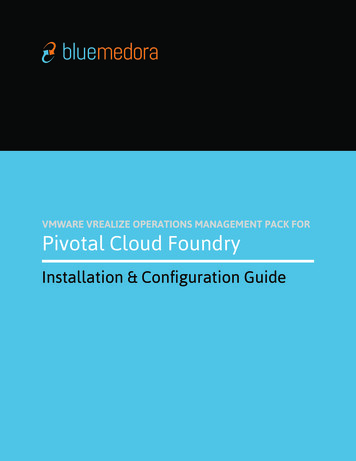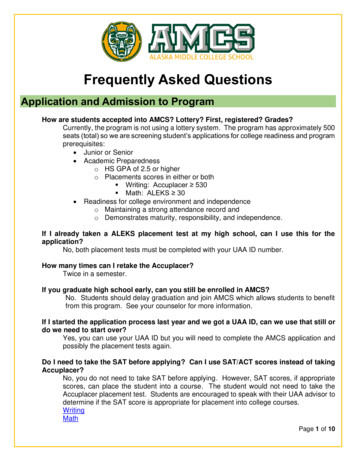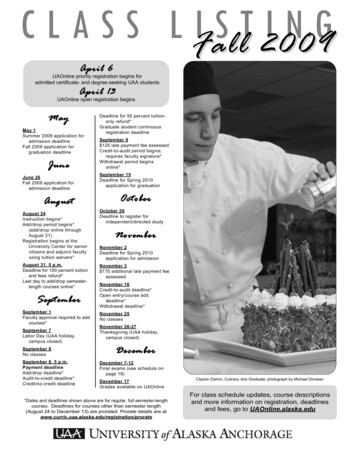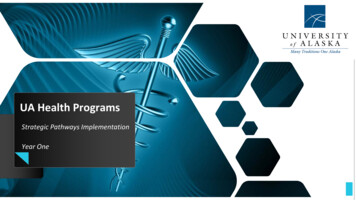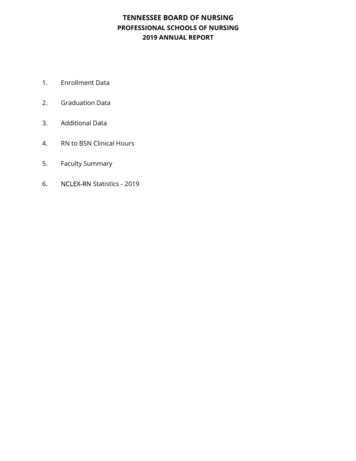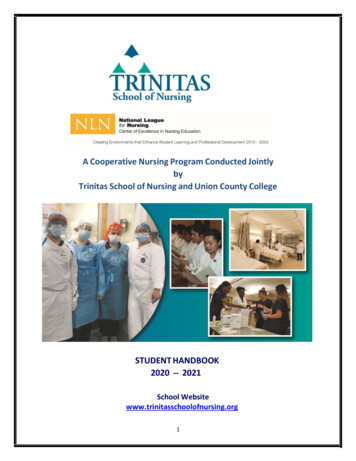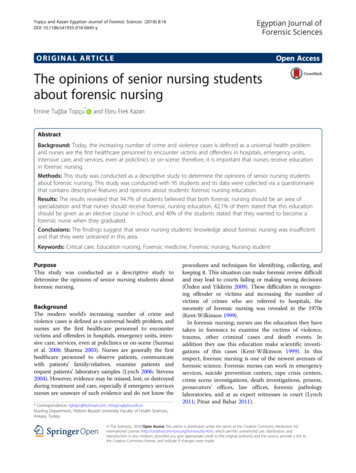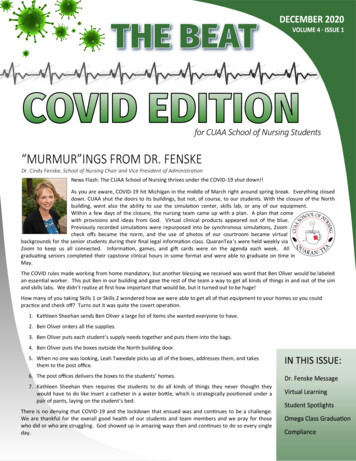
Transcription
for CUAA School of Nursing StudentsDr. Cindy Fenske, School of Nursing Chair and Vice President of AdministrationNews Flash: The CUAA School of Nursing thrives under the COVID-19 shut down!!As you are aware, COVID-19 hit Michigan in the middle of March right around spring break. Everything closeddown. CUAA shut the doors to its buildings, but not, of course, to our students. With the closure of the Northbuilding, went also the ability to use the simulation center, skills lab, or any of our equipment.Within a few days of the closure, the nursing team came up with a plan. A plan that comewith provisions and ideas from God. Virtual clinical products appeared out of the blue.Previously recorded simulations were repurposed into be synchronous simulations, Zoomcheck offs became the norm, and the use of photos of our courtroom became virtualbackgrounds for the senior students during their final legal information class. QuaranTea’s were held weekly viaZoom to keep us all connected. Information, games, and gift cards were on the agenda each week. Allgraduating seniors completed their capstone clinical hours in some format and were able to graduate on time inMay.The COVID rules made working from home mandatory, but another blessing we received was word that Ben Oliver would be labeledan essential worker. This put Ben in our building and gave the rest of the team a way to get all kinds of things in and out of the simand skills labs. We didn’t realize at first how important that would be, but it turned out to be huge!How many of you taking Skills 1 or Skills 2 wondered how we were able to get all of that equipment to your homes so you couldpractice and check off? Turns out it was quite the covert operation.1. Kathleen Sheehan sends Ben Oliver a large list of items she wanted everyone to have.2. Ben Oliver orders all the supplies.3. Ben Oliver puts each student’s supply needs together and puts them into the bags.4. Ben Oliver puts the boxes outside the North building door.5. When no one was looking, Leah Tweedale picks up all of the boxes, addresses them, and takesthem to the post office.6. The post offices delivers the boxes to the students’ homes.7. Kathleen Sheehan then requires the students to do all kinds of things they never thought theywould have to do like insert a catheter in a water bottle, which is strategically positioned under apair of pants, laying on the student’s bed.There is no denying that COVID-19 and the lockdown that ensued was and continues to be a challenge.We are thankful for the overall good health of our students and team members and we pray for thosewho did or who are struggling. God showed up in amazing ways then and continues to do so every singleday.
Rachel Thoms, Strategic CommunicationsThis story first appeared in the CUAA blog May 28, 2020Practicing Skills From HomeVirtual Clinical ExperienceIn early March, the university announced that classes would bemoved online, effective upon the completion of Concordiastudents’ spring break. With fast action and proactive planning,CUAA’s nursing staff began assembling and mailing to studentseducational “kits” that included vials, syringes, needles, IV bags,catheter kits, suctioning kits, and the like – materials needed tocontinue to grow in the profession.Hands-on clinical experience is a crucial element to nursingeducation.“We told them, send us your address of where you are going tobe for quarantine. We’ll get them to you,” said Kathie Pereira,Skills Laboratory Director, who worked with CUAA’s SkillsSpecialist Kathleen Sheehan to ensure students wouldn’t be at alearning disadvantage. “The kits included whatever they neededto practice their skills at home.”Concordia’s nursing faculty stepped up to the challenge ofcreating virtual assignments for clinical groups that gave them asreal of an experience as possible.Over 60 kits were mailed to the nursing students enrolled ineither Skills I or Skills II. Instructors gave live videodemonstrations while the students practiced what theyobserved and learned, submitting videos of their skills or doinglive demonstrations for check-offs.Pereira said the students practiced on stuffed animals, pets,family members, whatever worked for them. If the requirementfor that lesson needed a real person, for example when thestudents were asked to do head-to-toe assessments, then theyset up one-one-one video calls at night or on the weekends sothey could demonstrate the skill once that family member washome.“We had to pivot. We just had to,” said Pereira. “Once ournursing students are done with the program, we do not getthem back. It’s our job as educators to make sure they still fulfillthe obligations of their classes.”Skills instructor Kathleen Sheehan demonstrates how to hang IV piggybacks forstudents via Zoom from her home. Kathleen personally delivered someequipment kits to students who didn’t receive them via mail.The Michigan Board of Nursing limits the amount of simulationto replace clinical to 50% of the overall hours per course. Duringthe COVID-19 outbreak, the governor issued an executive orderstating that 100% of clinical hours could be replaced withsimulated activities for all courses through December 2020.Scenarios included patients with fractured hips, stroke patients,heart failure studies, plan of care changes, bowel obstructions,post-operative complications, and more. The students andinstructors debriefed the scenarios and talked aboutappropriate ways to address each and every situation from theactions they take, the decisions they make, and the words theyuse to patients and their families.Online nurse education resources are currently offering virtualclinicals for free or reduced rates. These resources haveprovided a platform for CUAA’s nursing instructors to work off ofand tailor to their lessons. Dean Fenske remarked that it hasbeen a huge blessing to be able to use these resources as astarting point for certain lessons and objectives, but the facultytook each resource a step further, adding labs and vitals to thescenarios to round out the lessons for the students.Tele-health interviews with family and friends of members ofthe faculty and staff who suffer from chronic illness or arecurrently in rehabilitation, were conducted by senior students intheir transitional care course. The students conducted interviews with these people to learn about how they have adaptedto living with their chronic issues. This type of healthcareappointment, also known as telehealth, is being used widely.Skills instructor Kathie Pereira demonstrates IV push medication administrationfor students from her home.
Meg HewittThis story first appeared in the CUAA blog September 18, 2020Mobile Camera UnitCOVID-19 was certainly a pivoting point for higher education institutions across the country. But, the pandemicserved as more of a catapult for a new way of learning for the School of Nursing at Concordia University Ann Arbor .For the past 12-18 months, CUAA’s School of Nursing has been working on the development of enhanced virtuallearning for their students. One of those enhancements being the mobile camera unit. SON had always had a state-of-the-art way to video capture lessons, simulations, etc. but the views offered a more simplified visual experience withoutmobile capabilities. Once COVID-19 hit, the need for a new system that could provide the best experience for those learningremotely was critical- so they buttoned up the final touches and launched- within weeks.The mobile camera unit is comprised of three cameras simultaneously directed at a patient that provides viewpoints from theceiling, front, back, and sides of the room. Normally, using video systems like this for skill-based concepts can only provide 1:1experience on YouTube- not full aspect at every angle. SON’s mobile camera unit system allows a streaming opportunity to a linkof the virtual experience, as well as the ability to edit, embed quizzes/surveys, assign video lessons and discussion questions tostudents in blackboard, and create an interactive educational experience.This system proved to be such a success that it continued to be used throughout the summer and not just during the COVIDmonths for OB, Pediatric, Community simulations, and skill labs. Anytime there is a need for physical hands/expression in learning,this system can be used to record a similar experience online. Ben Oliver, IT guru of SON, stated, “We’re taking the foundation ofeducational experience and amping it up a level.”Skills instructor Kathleen Sheehan createsan instruction video for students on how tospike IV bags and hang IV piggybackmedications.
STUDENT SPOTLIGHTConcordia nursing students joined the fight against COVID in many different ways.Here are their stories.Allison Garstecki— Epsilon Class (December 2021)“COVID-19 has changed our world in so many ways and most of them have caused devastation for people,not just physically, but spiritually, emotionally, mentally, and financially. It has been difficult to witness thedestruction of lives by this virus. I work as a Patient Care Tech at St. Joe's Hospital and we became what iscalled a "hot unit" from March until early May, which means we had positive COVID-19 patients and cared forthem on our unit. Many of the staff in our hospital, myself included, have not yet processed the trauma from caringfor COVID-19 patients, especially in the ICU. Because of the many emotional and financial impacts of COVID-19, Iknew that I needed to do something more. It is from my desire to help others, but mostly from the anxiety of notknowing what else to do, that inspired me to volunteer this summer when I was not working.Caring for mental health has been a passion of mine for a while, and I’ve always wanted to be a volunteer for a suicideprevention hotline. When the pandemic came around, I knew that people would need more mental health support thanever, so I decided this summer was the time. It’s been challenging and rewarding, and I have become part of a greatvolunteering community with Crisis Counselors. Empowering texters to move from a moment of crisis to an experience ofcalm has been interesting and inspiring with the help of supervisors and other volunteer counselors. I feel like learning aboutcrisis intervention will be helpful in my nursing career in any healthcare setting.Another aspect of life that has been disrupted by the pandemic is the ability of people, especially older individuals, to be able toget their groceries. Last year, I had been volunteering stocking exam rooms at the Hope Clinic in Ypsilanti. I discovered they hada partnership at the Farm at St. Joe’s that delivered groceries tohomebound patients, so I decided to do that on Friday’s this summer. Iwas able to do contactless delivery of groceries and fresh produce topatients in the area and it helped me realize how difficult it would beto an older individual, especially with health challenges, during apandemic. I was very excited about the partnership The Farm at St.Joe’s had with the Hope Clinic and to be involved in making sure ourcommunity members got the food that they needed. I hope to findtime to return to volunteer with them over the winter break.I am grateful for the opportunity to share this experience. We are all inthis together.”“Finally, be strong in the Lord andin the strength of His might. Put onthe whole armor of God, that youmay be able to stand against theschemes of the devil.”- Ephesians 6:10-12
Alexis Bailey—Eta Class (May 2022)“As a nursing student, I was inspired by all the amazing nurses risking their lives tosave lives through this pandemic. I knew I wanted to do something to help those sufferingaround us. I was blessed with the opportunity to work at Ford Motor company this summerand build life saving machines! I was in the testing area of ventilators; after the assemblyline I received the ventilator before it’s last step before being shipped out. I adjusted knobsand used a lung simulator to regulate the machine to be sure they were running smoothlybefore getting into the healthcare setting. I worked Monday- Saturday and occasionallySunday’s, and when asked I worked 12 hour days.This was such an eye opening experience to see this machine start from nothing at stationone and transform into a life saving device.Ford hired 1,300 workers to help with this project and from April to July Ford produced51,000 units. In one day I tested around 20-30 units and in total Ford made 1,200ventilators a day.I had the honor of working with my mother and brother this summer and I am beyondproud of our service and sacrifice during this project! This was an amazing opportunity and Iam blessed to be able to help those in need.”Olivia Hoeksema—Zeta Class (December 2020)“In August I began to volunteer with Stanley Stinson (December 2019 CUAA BSN Graduate)on Tuesday nights with Covenant Community Care. Our main goal was to ensure that thosewho were homeless or sleeping on the street had food and water provided to them, aswell as, providing medical care. I completed dressing changes, provided prenatal vitamins,treated sexually transmitted disease through a single course of antibiotics, which wenamed the STI cocktail. I also helped perform incision and drainage of wounds and talkedwith various people about options about places to shower, treatment for drug rehab, andfuture treatment through the clinic if needed.COVID had stopped many other organizations from heading out during the day andresources were limited. Those who were on the streets did not have the usual aid andresources that were previously available. We continued to head out during the week andserve those in need, ensuring that safe measures were in place for each volunteer. Weadditionally provided masks for those we encountered to ensure that everyone wasstaying safe and preventing the spread of COVID.”“No, in all these things we aremore than conquerors throughHim who loved us."- Romans 8:37
On Saturday, October 11th the School of Nursing held a socially-distanced pinning ceremony for the May 2020 Omega Classgraduates and a few of their family members. The original ceremony was unfortunately delayed due to COVID.During the pinning ceremony, the nursing team created graduate awards based on thefour value words on our cornerstone wall, which is found just inside the simulationcenter. These values of SERVICE, EXCELLENCE, COMPASSION, and INTEGRITY, arepreeminent in our program. We expect all of our students and graduates to emulatethese values in their lives and as they care for their patients. An additional award, TheNightingale Award, was created as a tribute to Florence Nightingale who viewednursing as her calling from God. It is meant to highlight a graduate who exemplifiesthis type of character. The award recipients do not know they are receiving the awarduntil their names are called.Lauren Baranski—presented by Dr. Cindy Fenske, RNTammy DeLane—presented by Dr. Renee Clemons, RNFlorence Nightingale is an iconic figure who isresponsible for the philosophy andunderpinnings of modern day nursing. Priorto her, nursing was looked down upon asunimportant and was a low status job.Through her efforts, nursing was reborn intothe trusted profession we know today. Thename of Florence Nightingale is oftenassociated with nursing excellence, compassion, service, andthe ability to care for others no matter what the conditions.Florence Nightingale viewed nursing as her calling from Godand gave her life and passion to the care of others.The award this year goes to a graduate that showed a high levelof accomplishment throughout their time at CUAA. Thisgraduate embodies what it is to be a Concordia nurse. Sheexhibited an unwavering commitment to excellence in everycourse within the program. She always came prepared to class,simulation and clinical and always participated to the fullestextent. She was a hard worker who excelled in all of herclasses. She was a quiet leader, providing her classmates withmuch encouragement, support, and compassion, even in themidst of her own personal loss and grief. Her patients werecared for with care and compassion, many commenting on herkindness towards them. Her preceptor in the MICU commentedon her ability to effectively manage patients requiring complexthinking skills, as well as her ability to truly serve her patients.She is a woman of integrity with a servant’s heart. The nursingteam felt strongly that this person clearly represented theideals that Florence Nightingale held so dear.Excellence is characterized by demonstratingactions or behavior which convey merit orgreatness above an expected level. Thisaward is presented to a nursing student whohas demonstrated advanced critical thinkingskills in dynamic situations and problemsolving skills in both nursing theory andclinical practicum courses.I had the wonderful opportunity to have this student in ourMedical-Surgical 1 class and again in Psychological Wellness. Ialso spoke with my fellow colleagues who reported nothingshort of praise and respect for this individual. Throughout ourprogram, instructors described this student as always beingpunctual, prepared, organized, and “on top of things”. Thisstudent was not only an “Out of the box” thinker, she was neverafraid to challenge instructors with “If this, than what, and Why”questions. A simple explanation was not really good enough.And, in terms of with excellence, it should not be.This student also excelled academically, earning some thehighest of marks in the program. Works submitted were alwayson time and usually early, and very thorough. This student leftno stone unturned in her studies. We the faculty watched yousucceed in a very rigorous nursing program balancing not justschool, but work, your family and some challenging healthissues during your journey here. You were juggling many, manyresponsibilities. This was not an easy task but you did it. You didit always wanting to do better. If I remember correctly, you mayhave emailed an instructor asking if it was possible to earn 100%on a Kaplan score as opposed to the 95. I like that! That is whatexcellence is, always striving for more. Why settle for the 95,when you can earn the 100!
Lillian Thompson—presented by Anita Simmons, RNIntegrity is defined as soundness of moral character, and adherence to ethical principles. In the Bible, the bookof Proverbs mentions integrity: “Whoever walks in integrity walks securely, but whoever takes crooked paths willbe found out.” (Proverbs, 10:9, GNB). Integrity means doing the right thing even when it goes unnoticed, and isan attribute of great nurses. And so we expect Concordia nurses to display integrity: to be heartfelt andhonorable.I have had the privilege of working closely with the recipient of this award in many aspects of nursing school andher integrity has shown through in every setting. As a nursing student, this graduate was always prepared,thorough, honest, and exemplary in her work. She was always engaged in class discussion and providedleadership to her peers. As a student worker at the School of Nursing, this graduate not only got the job done, but did it well- andwithout prompting. She could always be depended upon without question for every detail to be on point. She also was a greatmentor to new workers- showing patience and leadership. As a Student Nurses’ Association officer, this graduate was an integralcatalyst to getting our SNA chapter here started. She was elected as an inaugural officer and, later, president. She led with integrityand put great effort into providing service to our nursing school and community. As a person, this graduate always conveyed highmorals in all her interactions. She is friendly, kind, caring, honest, positive, and genuine.Kallie Hunley—presented by Betsy Cambridge, RNService is one of our program’s cornerstone virtues. It is defined simply as that act of doing something forsomeone else without the expectation of being rewarded.Let us co
In early March, the university announced that classes would be moved online, effective upon the completion of oncordia students’ spring break. With fast action and proactive planning, UAA’s nursing staff began assembling and mailing to students educational “kits” that
